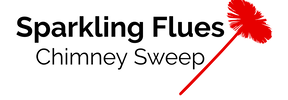Your Frequently Asked Questions
Why do I need to have my chimney or flue swept?
Chimneys need to allow free passage of dangerous combustion gasses. Regular cleaning will remove soot and creosote, helping prevent dangerous chimney fires. Cleaning will increase the efficiency of some appliances. Bird nests, cobwebs and other blockages will be removed.
How often does my chimney need sweeping?
The sweeping frequencies below are for guidance. Frequency will depend on a number of factors including the type of fuel, appliance used, duration of use, moisture content of wood fuel, and type of chimney.
• Smokeless Fuel: At least once a year
• Wood: Quarterly when in use
• Bituminous coal: Quarterly when in use
• Oil: Once a year
• Gas: Once a year
• Smokeless Fuel: At least once a year
• Wood: Quarterly when in use
• Bituminous coal: Quarterly when in use
• Oil: Once a year
• Gas: Once a year
Why should I use a registered Guild Chimney Sweep?
As a Guild Registered Chimney Sweep we have undertaken an extensive training and assessment process. Training is based around the most comprehensive training manual in the UK. Guild membership requires members to be insured for Chimney Sweeping and equipped to deal with all standard job situations.
Does it make mess?
This is a very good question to ask. The answer should be - very rarely. A rare exception may be when the chimney is blocked with a bird’s nest when it is sometimes difficult to contain all dust.
What should you do to prepare for my appointment?
Please provide a clear passage to the chimney and adequate space to work in. I would also be grateful if you could remove all ornaments from the hearth and perhaps from the mantelpiece. In particular, clear the grate of any fuel, ash and rubbish.
Do I need to have my gas or oil flues swept?
Yes. Although burning these fuels does not normally deposit soot there are numerous other problems which can affect chimney function and sweeping can solve or identify these. In countries such as Germany, where sweeping all chimneys and flues is a legal requirement, the number of carbon monoxide poisonings and chimney fires are a fraction of the UK.
Can you disconnect my gas or oil appliance?
I am not gas safe or oftec registered so cannot disconnect any gas or oil appliance.
I have a problem with my fireplace/stove/chimney
In the UK there is a general lack of knowledge concerning all aspects of solid fuels, solid fuel appliances and their associated chimneys. Problems are therefore not uncommon and it can be difficult to get qualified, independent advice. Guild sweeps are trained to high standards and are usually conversant with the complexities of solid fuel heating and venting systems and the associated building regulations.
I’ve just moved house – do I need to have my chimney cleaned?
Yes! A chimney fire isn’t the kind of housewarming you want.
What is the best fuel to use?
For certain appliances, there is a recommended fuel, and this is the one you should use. In appliances where there are no such requirements, there are several things that need to be taken into consideration. As a general fuel we recommend wood. It is clean, gives good heat and is carbon neutral. However, at the end of the day, some people don’t get on with wood and find coal suits them better. If you are looking at coal, find your local approved coal merchant who will have the expert knowledge to guide you.
Why do I need to sweep a chimney before it is closed off?
If a chimney is closed off, it can get a bit damp. If there is soot up there, then this soot can turn to a black acidic slurry that in an old chimney can soak into the internal walls causing severe problems. If bad enough this damp can penetrate through to the room where it will cause unpleasant stains on the walls.

